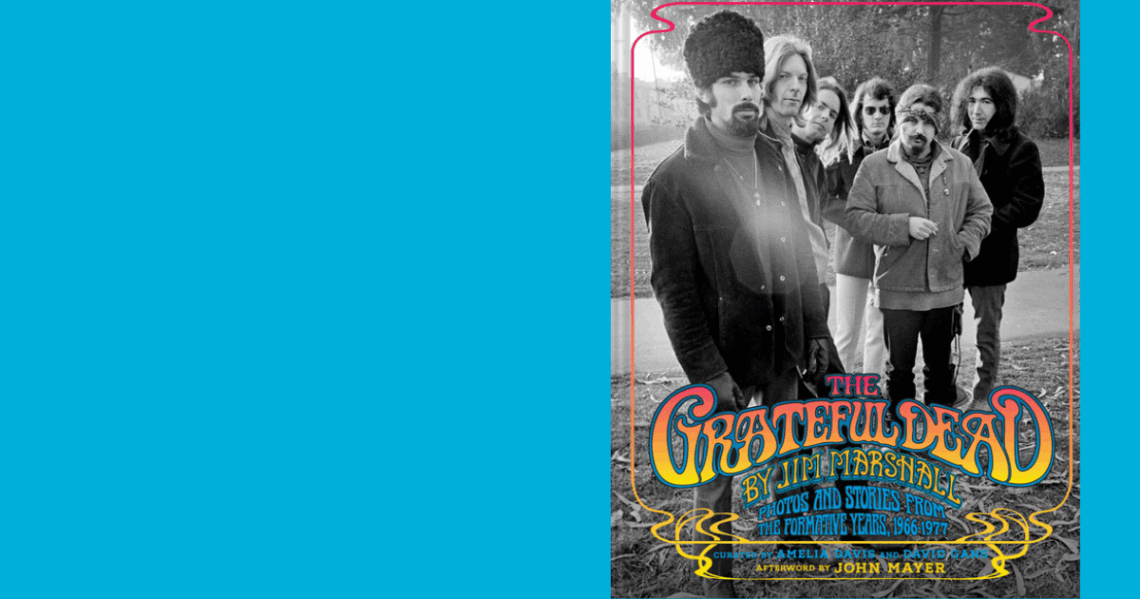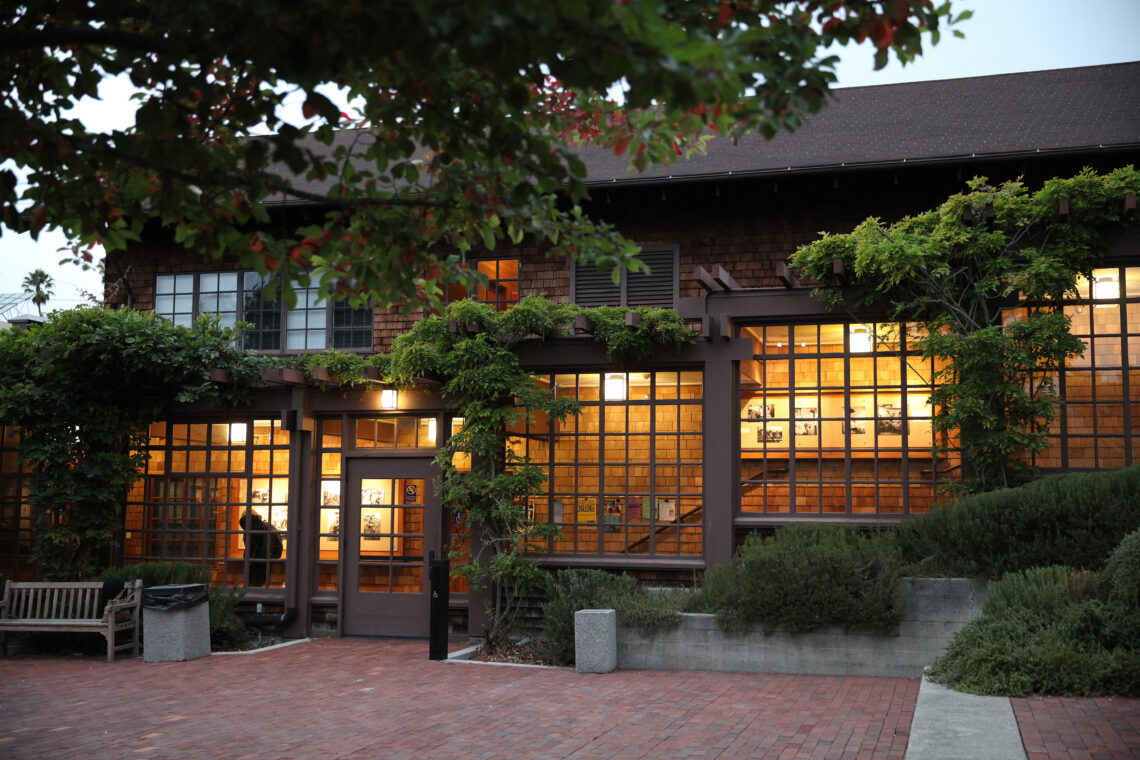June 6, 2018
Greetings from North Gate Hall:
At a time when the civic mission of the news media is under assault, the rise of the #MeToo movement reminds all of us of the transformative power journalism can have when determined reporters ignore decades of neglect and expose practices that systematically disadvantage millions of people. That’s why it was a special moment when the Class of ’18 invited one of the very best of those reporters, Jodi Kantor of The New York Times, to be our commencement speaker this year. Kantor shared a Pulitzer for helping unearth the Harvey Weinstein scandal, and her speech—emotionally forthright and professionally inspiring—is one I urge you to hear. It’s available here.
Her address was joined by stirring speeches by two graduating students, Ryan Lindsay and Sawsan Morrar, which you can listen to here and here.
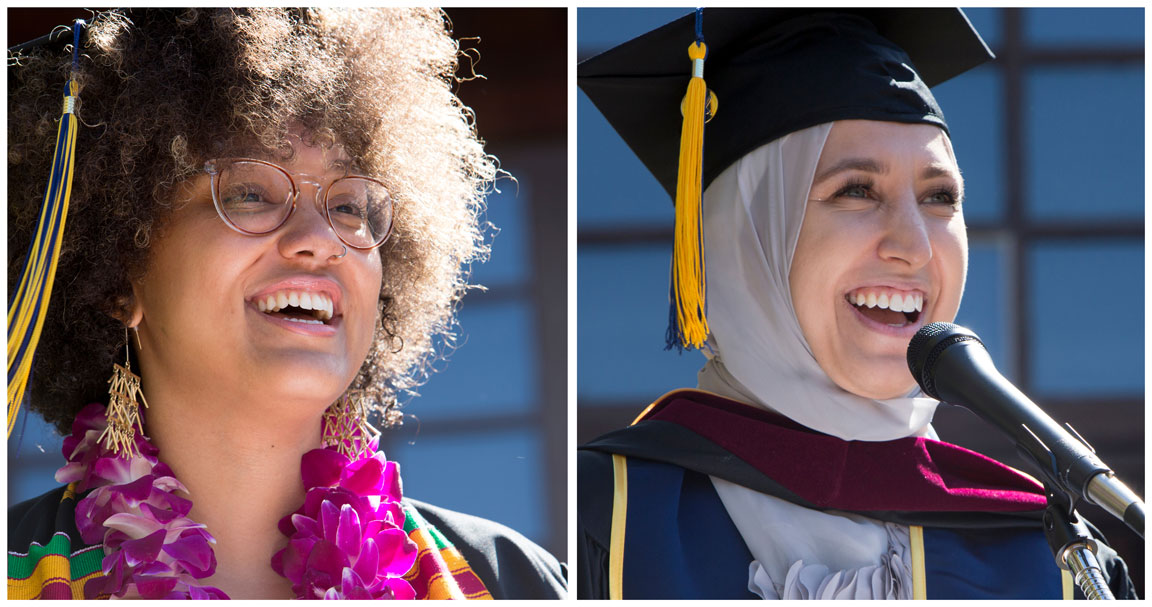
2018 student commencement speakers Ryan Lindsay, left, and Sawsan Morrar. Photo: Anne Wernikoff (’19).
It’s a pleasure to share master’s thesis work from the Class of ’18, including Rachel Cassandra’s moving project, “’It Controls You:’ Nine Months With a Fresno Mother Battling Addiction and Homelessness,” on KQED Radio’s California Report, and Marc Vartabedian’s front-page Los Angeles Times story on Mexico’s own Motor City. Keep an eye out for future updates on student thesis documentaries that are vying for placement at film festivals and industry competitions.
We have excellent news when it comes to faculty replenishment. Geeta Anand, a Pulitzer-winning ex-New York Times (and ex-Wall Street Journal) foreign correspondent, will take over the professorship of reporting, and Dawn Porter, whose moving four-part series on Bobby Kennedy is airing right now on Netflix, joins the School as professor of documentary and interim head of our documentary film program. Read the announcements of Geeta’s hire here, and Dawn’s here. Please join us in welcoming them into the J-School family…
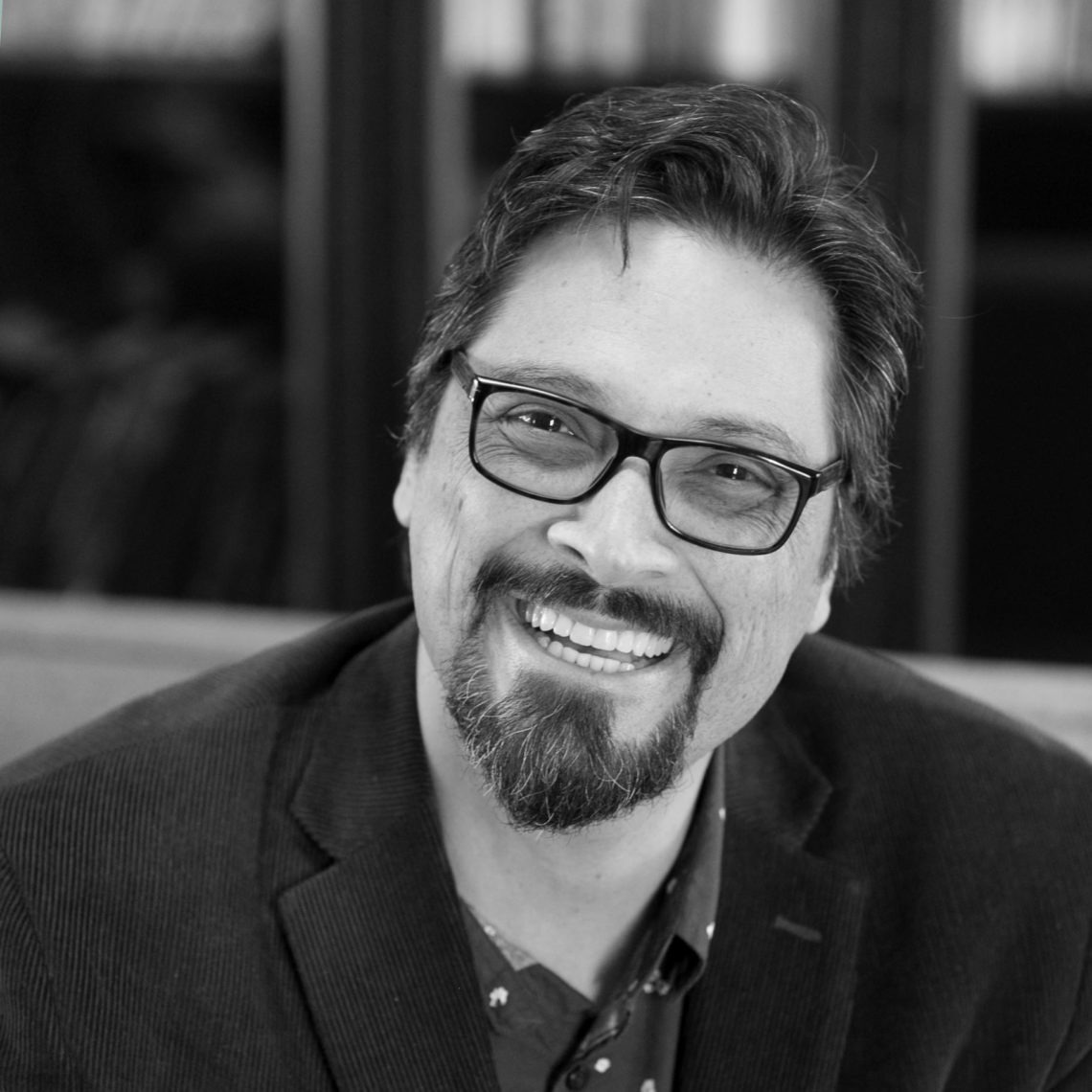
Associate Prof. Richard Koci Hernandez.
I was also pleased to name Richard Koci Hernandez the Bloomberg Chair, officially assuming the position formerly held by his mentor and friend, the late Paul Grabowicz, who pioneered our groundbreaking New Media program starting in the mid-1990s.
I’m also pleased to report that the Chancellor recently appointed me to a second 5-year term. Read the announcement here. It’s awkward to quote yourself, so forgive me for reiterating: “There is an urgent need for principled, intellectually relentless, eloquent, and committed professionals, whose loyalty is to the public and who don’t apologize for seeking social betterment. Preparing those people is a privilege. And there’s no better place in the country to do it than at UC Berkeley.”
A warm thanks to each and every person who has made me feel welcome and helped me in this challenging and rewarding job. This is the most exciting time to be a journalist, especially here, embedded in one of the world’s top public universities, where the spirit of camaraderie and the sense of social purpose that animates our close-knit community is a continuing source of comfort and inspiration.
In a significant gesture of support for what he has termed a “strong, vigorous and trustworthy press,” Craigslist founder and J-School Advisory Board member, Craig Newmark, last month made a $500,000 gift to the School. This investment will help strengthen our data journalism teaching capacity—with special emphasis on building the capacity to ferret out disinformation and expose its source. It will also augment our ability to support the next generation of outstanding journalists, and enable the School to serve as a leader in the effort to ensure truth in journalism. We admire Craig Newmark’s outspoken leadership on this topic and we’re glad that he has chosen to deepen his partnership with Berkeley Journalism.
In student news, Reis Thebault (’18) was part of the Peabody Award-winning Washington Post / 60 Minutes team that produced “The Whistleblower,” a joint investigation into how the drug industry triumphed over the DEA’s effort to combat the nation’s opioid crisis. Thebault joined 60 Minutes correspondent, alum and Berkeley Journalism Advisory Board member Bill Whitaker (’78/’17) on the team.
Rosa Furneaux (‘18) received a $4,000 Dorothea Lange Fellowship, an annual award given to a UC Berkeley graduate student or faculty member who has produced outstanding work in documentary photography. Read an interview with Furneaux about how the fellowship will allow her to photograph girls and young women in Kenya who have been pushed into sex work by climate change. The project will be a follow-up to her master’s thesis.
Cat Schuknecht (’18) produced a segment for Reveal from The Center for Investigative Reporting’s latest episode “Trumping Hate,” examining what it means–and what it takes–for people on the sidelines of hate speech incidents to go beyond acting as bystanders. Listen here.
Khaled Sayed (’18), associate producer/researcher/photographer for NBC Bay Area’s “Unmasking Antifa,” received an Edward R. Murrow Award. He was part of a team that spent months cultivating relationships with members of an anti-fascist group during the period of protests and clashes that rippled across the nation after the 2016 elections. Watch it here.
Sawsan Morrar (’18) filed an account of Stephon Clark’s funeral for The Washington Post. Clark was an 18-year-old unarmed black man shot dead by Sacramento police in March.
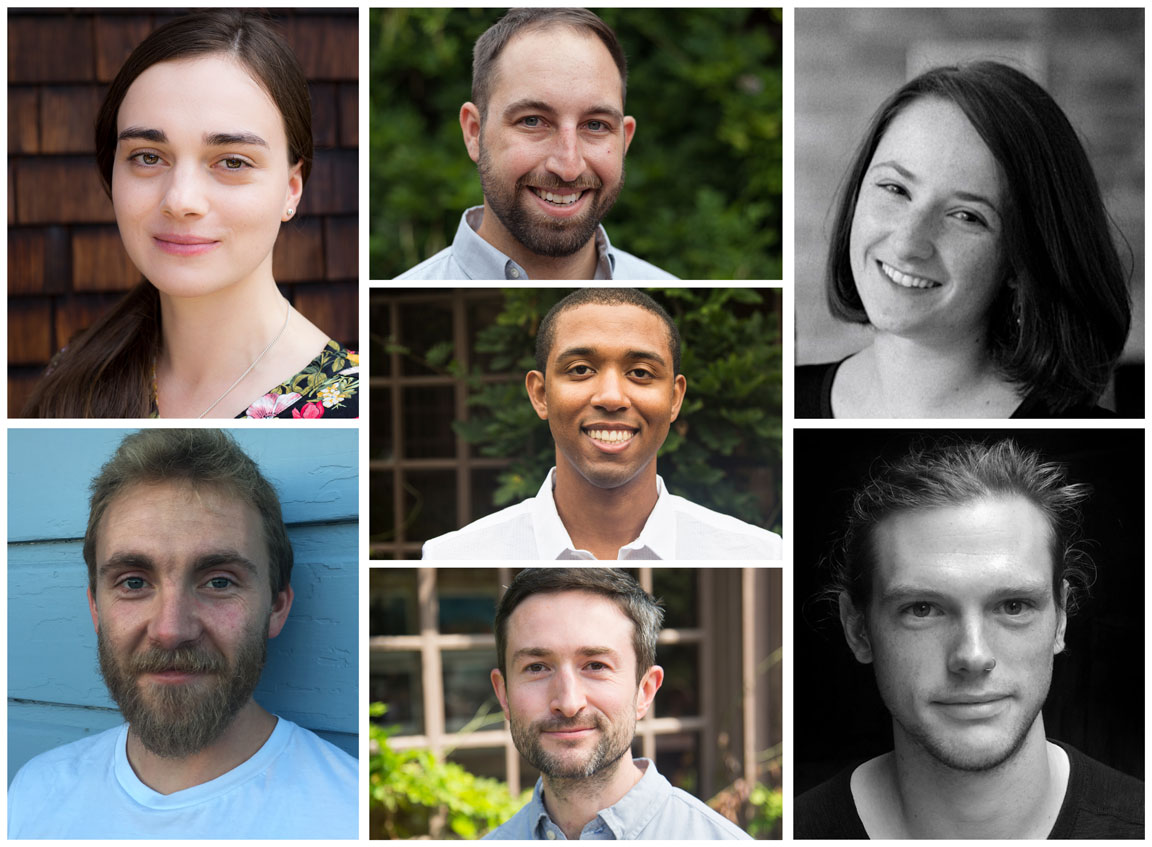
Seven students—(clockwise from top left) Rosa Furneaux (‘18), Spencer Silva (‘18), Ariel Plotnick (‘18), Reis Thebault (‘18), Simon Campbell (‘19), Jacob Shea (‘18), and (center) Alex Nieves (‘19)—were winners/finalists in the Society of Professional Journalists’ Mark of Excellence Awards, which recognize the best in Northern California student journalism.
Olivia Rempel (’18) has been awarded a UC Berkeley Human Rights Center fellowship to shoot a documentary short on wastewater management and sanitation in Africa—a massive environmental issue with deadly human consequences.
“Living with Lions” is a documentary short by producers and ’18 classmates Nani Walker and Alan Toth exploring the conflict between lions and humans in Laikipia County, Kenya, where drought and urbanization have pushed them into closer contact. Their film was acquired by The Atlantic. You can see it here.
Our core mission, of developing crack journalists with strong career prospects, has always made extensive use of internships to give students opportunities to deepen their workplace expertise and to network with potential employers. The Class of 2019 has begun theirs everywhere from The New York Times to the San Francisco Chronicle to NPR and NBC News; in locations as near as KALW in the Bay Area and as far as the Reuters bureau in Nairobi, the Associated Press’s Mexico City and Jerusalem bureaus, at Folha de São Paulo, a major newspaper in Brazil and TV network Iqraa TV in Saudi Arabia.
Alondra De La Cruz (’19) was awarded a $5,000 White House Correspondents’ Association (WHCA) scholarship, and was one of five students awarded the first annual $10,000 National Association of Hispanic Journalists (NAHJ)/Facebook Journalism Project Scholarship.
JoeBill Muñoz (’19) was awarded the Walter and Betsy Cronkite Scholarship for Aspiring Foreign Correspondents from the Overseas Press Club of America to work at the Associated Press Bureau in Mexico City.
Caron Creighton (’19) is reporting on Eritrean and Sudanese migrants in Israel for the Pulitzer Center on Crisis Reporting, via a Campus Consortium grant.
Susie Neilson (’19) was awarded the Council for the Advancement of Science Writing’s Taylor-Blakeslee Fellowship to work at the Berkeley-based Center for Investigative Reporting.
Cecilia Lei (’19) was selected for the Asian American Journalists Association’s Voices Class of 2018 program, a summer-long journalism training fellowship for undergraduate and graduate students that concludes with presentation of student projects at the AAJA National Convention in August in Houston.
Two students have received scholarships from the National Association of Hispanic Journalists (NAHJ). Alex Nieves (’19) won the Hortenzia Zavala Scholarship and Nuria Marquez Martinez (’19) was awarded the Ruben Salazar Scholarship.
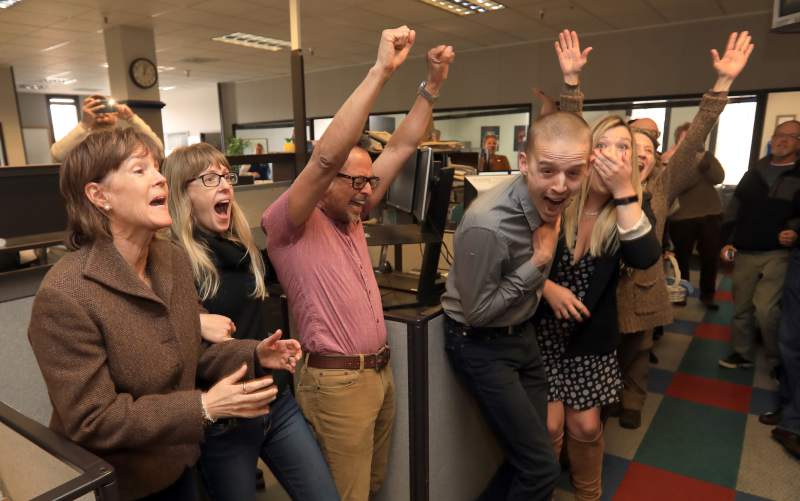
Press Democrat staffers celebrate the announcement of the paper’s Pulitzer Prize in April. From left: Randi Rossmann, Julie Johnson, Martin Espinoza, JD Morris, Christi Warren, Mary Callahan and Chad Surmick. (Kent Porter/The Press Democrat via AP)
In alumni news, Julie Johnson (’09), Brett Wilkison (’08), Kathleen Lund Coates (’78), Robert Digitale (’79) and Diane Peterson (’82) of the Santa Rosa (Calif.) Press Democrat, shared the Pulitzer Prize for Breaking News “for lucid and tenacious coverage of historic wildfires that ravaged the city of Santa Rosa and Sonoma County.” Read Rosa Furneaux’s (‘18) profile of the winners here.
Brett Murphy (’16) also was honored by the Pulitzer judges, and was named a finalist for his USA TODAY series on shocking conditions for port truckers. Brett began reporting this series at the School’s Investigative Reporting Program after incubating it in Assoc. Prof. Richard Koci Hernandez’s New Media workshop as his master’s project. The series also earned him the 2018 Hillman Prize for Newspaper Journalism and made Murphy a finalist for the Livingston Awards for Excellence in National Reporting. The Livingston awards honor the best reporting and storytelling by journalists under the age of 35.
Two other alums were honored with Livingston nominations. Roberto Daza (’12) of Fusion was named a finalist for Excellence in International Reporting for “O Girls,” on Oprah Winfrey’s leadership academy in South Africa, and Rachel Witte (’14), of NBC Bay Area, was a finalist for Excellence in Local Reporting for “Kicked Out,” an investigation of wrongful evictions in the Bay Area.
Brad Bailey‘s (’17) Student Academy Award-winning thesis documentary “Hale” screened at the 21st annual American Pavilion Emerging Filmmaker Showcase at the Cannes Film Festival. Bailey is also shortlisted for The British Academy of Film and Television Arts (BAFTA) Student Film Awards.
“We Became Fragments,” a documentary short on a teenage Syrian war refugee starting over in Canada by alums Lacy Jane Roberts, Hanna Miller and Luisa Conlon (’17) ran on New York Times Op-Docs. Watch it here.
Débora Silva Souza (’14), a documentary filmmaker whose work examines systemic racism and inequality, won a Gracie Award from The Alliance for Women in Media for the four-part documentary series “The Aftermath.”
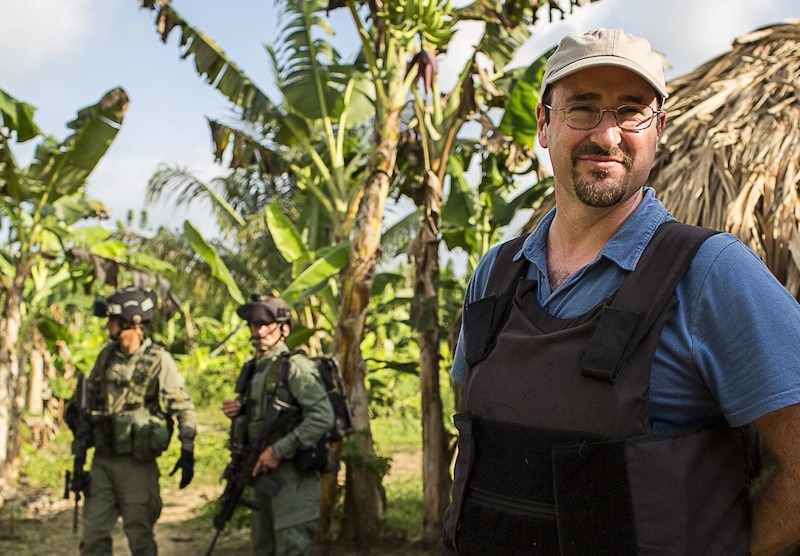
Washington Post national security correspondent Nick Miroff (‘06).
We make it a point to celebrate the continuing success of Berkeley Journalism graduates and use their careers to guide those who follow them. Most recently, Sam Goldman (‘19) profiled Washington Post national security correspondent Nick Miroff (‘06).
In April, PBS Frontline aired the Investigative Reporting Program’s latest documentary “Trafficked in America.” The film—produced by alums Daffodil Altan (’04) and Prof. of Visual Journalism Andrés Cediel (’04), with Altan as correspondent— investigates how teenagers from Central America are smuggled into the U.S. by traffickers who promise them jobs and a better life, only to force them to work in virtual slavery to pay off their debts. Watch it online here.
IRP founder Prof. Lowell Bergman and IRP Director John Temple were the film’s executive producers. Alums Loi Ameera Almeron (’16) and Kathleen Seccombe (’15) were among its associate producers.
A number of other graduates worked on the film: Zachary Stauffer (’08) was a director of photography. Steve Fisher (’14) and Melina Tupa (’16) contributed reporting and field producing. Nadine Sebai (’16) provided research, and Dan Steiner (’16) assisted in editing. Faviola Leyva (’16) and Marcos Martínez Chacón (’17) provided transcriptions and Spanish translations.
The IRP has announced its 2018-19 fellows: filmmaker Débora Souza Silva (’14); Susannah Breslin, whose work has appeared in The Atlantic, Slate, Salon, The Daily Beast, Newsweek and The Guardian; and The Bell founder Elizaveta Osetinskaya, an award-winning investigative reporter and editor with more than 20 years of experience in Russian newsrooms.
The IRP’s fellowships, the nation’s first post-graduate program in investigative reporting, were established in 2007 in response to cutbacks at major news organizations. The program enables journalists to pursue stories for up to one year by providing them with salary, travel expenses, benefits and editorial guidance.
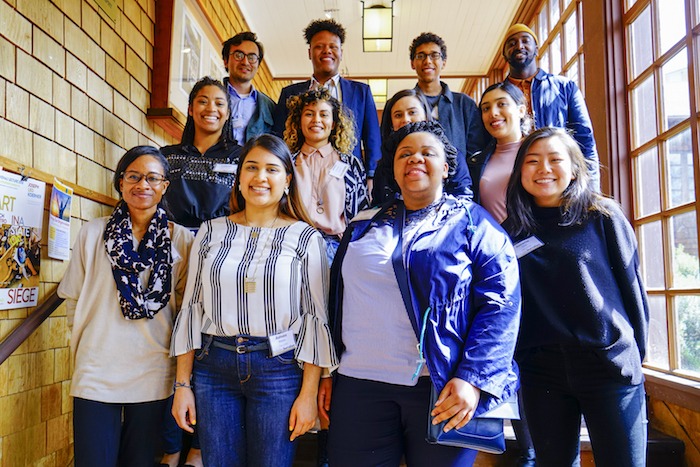
The 2018 Johnathan Rodgers Fellows. Photo: Yesica Prado (’18)
Twelve recently admitted students from as far away as Virginia, Mississippi and Wisconsin attended the School’s annual Spring Welcome Week in mid-March as Rodgers Fellows. Funded annually by media executive and UC Berkeley alum Johnathan Rodgers (’67), the Rodgers Fellowships are designed to increase diversity at the School by covering the cost of attending Spring Welcome Week for selected students who are deciding where to pursue their graduate studies.
In faculty news, “You Can’t Give In,” a narrative feature that lecturer Chris Ballard wrote for Sports Illustrated about former NBA player and coach Monty Williams’ struggle with grief, is one of 12 finalists for the Dan Jenkins Medal for Excellence in Sportswriting, which will be awarded Sept. 21. The same story took first prize for magazine-length features in the annual Professional Basketball Writers Association Blumenthal Memorial Writing Contest.
Lecturer Adam Hochschild wrote a cover story on guns and gun culture in The New York Review of Books, and gave guest lectures at Regis University in Denver and San Diego State University. A new book by this bestselling author, featuring over two-dozen works from his long career, Lessons from a Dark Time and Other Essays, will be released in October.
Lecturer Peter Aldhous has been awarded the JSK Fellowship Award for Innovation in Data Journalism from the Global Editors Network, among the premier international awards for data journalism. The award is for his Hidden Spy Planes series, published by BuzzFeed News, in which Aldhous used machine learning to find covert surveillance aircraft operated by the US military, its contractors, and federal, state, and local law enforcement. One of the stories in the series was co-bylined by Christian Stork (‘17), who helped with the extensive public records and other reporting needed to confirm and extend the insights from the machine learning.
Lecturer Mark Schapiro wrote a fascinating story, “How Seeds from War-Torn Syria Could Help Save American Wheat,” in Yale Environment 360.
Lecturer Edwin Dobb has a major feature called “Poisoning Africa” in the August issue of National Geographic.
Lecturer Jennifer Kahn (’00) gave the opening keynote at the Genes, Society, and Technology conference in Stockholm.
Lecturer Tim McGirk (’74) collaborated on the documentary “House 2,” which premiered at the recent Tribeca Film Festival. Directed by Michael Epstein, the film delves into the 2005 killing of 24 Iraqi civilians by U.S. Marines in Haditha, a story that McGirk originally broke in Time magazine. The film reports that current Defense Secretary James Mattis was directly responsible for ensuring that none of the Marines accused of the massacre was ever imprisoned. McGirk was also chosen by the Class of ’18 to speak at commencement, and gave a riveting talk about the role of serendipity in his long career as a foreign correspondent. You can hear it here.
Continuing Lecturer Thomas R. Burke recently concluded a Freedom of Information Act lawsuit filed on behalf of the University of Washington (and its Center for Human Rights) against the Central Intelligence Agency that forced the release of hundreds of records that shed light on massacres that took place in El Salvador during the country’s 12-year civil war, some three decades ago. At least one of the documents has since been admitted in evidence by the Salvadoran Supreme Court as part of the country’s investigation into the massacres, among the worst in the modern history of the Americas.
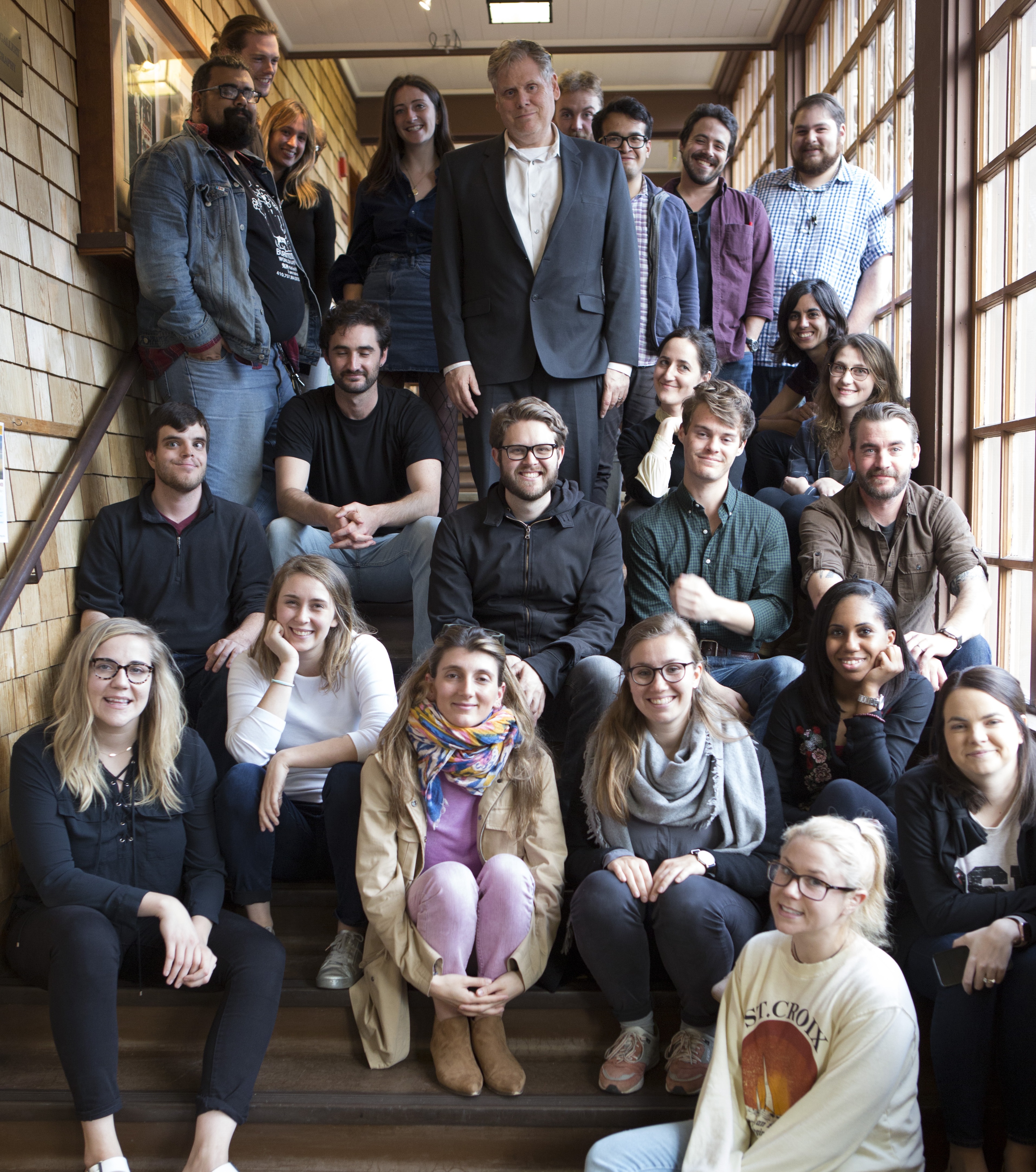
Pulitzer Prize-winning investigative reporter/lecturer (standing, center) Tom Peele and students in his Freedom of Information class. Photo: Anne Wernikoff-Mill (’19)
Among recent events, in April we hosted investigative reporters David Corn and Michael Isikoff in conversation with lecturer Deirdre English for a discussion of their recent book, Russian Roulette: The Inside Story of Putin’s War on America and the Election of Donald Trump, before a packed house. Watch it here.
The Investigative Reporting Program (IRP) held its annual Reva and David Logan Symposium on Investigative Reporting in April. This invitation-only conference is the West Coast’s largest gathering focused on investigative reporting. This year’s event featured panels about covering the #MeToo movement, race and hate, and the Trump-Russia story, as well as conversations with former CIA Director John Brennan, Google News’ Richard Gingras, and First Amendment scholar and UC Berkeley Law Dean Erwin Chemerinsky.
In May, the Women In Media student group, co-chaired by Mary Newman (’18) and Mallory Newman (’19), hosted a Female Power Mixer for local women journalists in the Bay Area. Over 50 people attended, including students, alumni and other professional journalists.
The School also hosted a West Coast edition of Chicago’s prestigious Third Coast International Audio Festival with a special program: The State of the Story, a conversation about how podcasts are reshaping audio storytelling. Lecturer Ben Manilla, director of audio, hosted a panel of audio makers and critics who shared work that has made a mark, ignited conversations and pushed the boundaries of audio. Panelists included Johanna Zorn (Third Coast), Al Letson (Reveal), Sandhya Dirks (KQED) and alum Julie Caine (’07) (Al Jazeera).
In other news, Manilla’s podcast, “Masters of Scale with Reid Hoffman,” was awarded a Webby in the Business category.
We recently hosted the Bloomberg-UNC-Berkeley Business Journalism Diversity Fellows, for rising college juniors and above to introduce them to the dynamic field of business journalism and increase diversity among journalists reporting on business. The week-long programs, held at the University of North Carolina, Chapel Hill, School of Media and Journalism and Berkeley Journalism, were taught by senior Bloomberg journalists and executives including Matt Winkler, Editor-in-Chief Emeritus of Bloomberg News, who literally wrote the book on how Bloomberg reporters should cover business news.
The UC Berkeley Advanced Media Institute (BAMI) partnered with the Norwegian Institutt for Journalistikk to produce a unique and highly acclaimed Media Innovation Tour & Summit in Oslo and Berkeley in May. The program began in Oslo by training 22 journalists from 17 Norwegian news organizations in applying human centered design to media innovation. We then moved to Berkeley where the journalists heard from leading media innovation experts about the opportunities and consequences of AI, AR & VR to media and journalism, how Civil is employing blockchain and cryptocurrency to revolutionize the online news ecosystem, why bots matter, and Mother Jones magazine’s approach to engaging audiences. More on the details of this outstanding program can be found here.
Video and audio of our Inaugural Esther Wojcicki Lecturership event in March with Kara Swisher of reCode and Farhad Manjoo of The New York Times—including a welcoming speech from honoree and Advisory Board member Esther Wojcicki (’64)—is available to watch here and hear on reCode, here. Special thanks to Tad Taube and Taube Philanthropies for sponsoring this annual series.
In recent podcasts of the School’s continuing On Mic series, Prof. Michael Pollan sat down with lecturer Deirdre English for an illuminating discussion of his new, widely-reviewed book, How to Change Your Mind: What the New Science of Psychedelics Teaches Us about Consciousness, Dying, Addiction, Depression, and Transcendence. The episode was produced by students Lee Mengistu (’19) and Cat Schuknecht (’18).
We also just released the first of a two-part conversation with bestselling author and Prof. Mark Danner and Deirdre English on America’s “Forever War.” Listen to it here. Coming soon: The New York Times’ Jodi Kantor, along with Michael Isikoff and David Corn, authors of Russian Roulette.
The latest Food and Farming Fellows, a program established by Prof. Pollan, the John S. and James L. Knight Professor of Journalism, have been announced, and include alums Mallory Pickett (‘16) and Levi Bridges (‘17). Aimed at early and mid-career journalists, the Fellowships support ambitious long-form print and audio stories on the full range of subjects under the rubric of food systems. The program is funded by The 11th Hour Project, a program of The Schmidt Family Foundation created by Journalism School alumna Wendy Schmidt (’81).
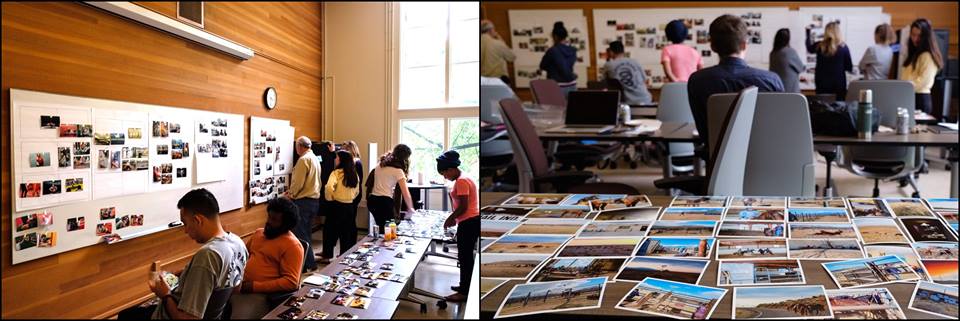
Logan Photojournalism Prof. Ken Light and students edit our annual student photography magazine Realeyes. Photos: Jared Stapp.
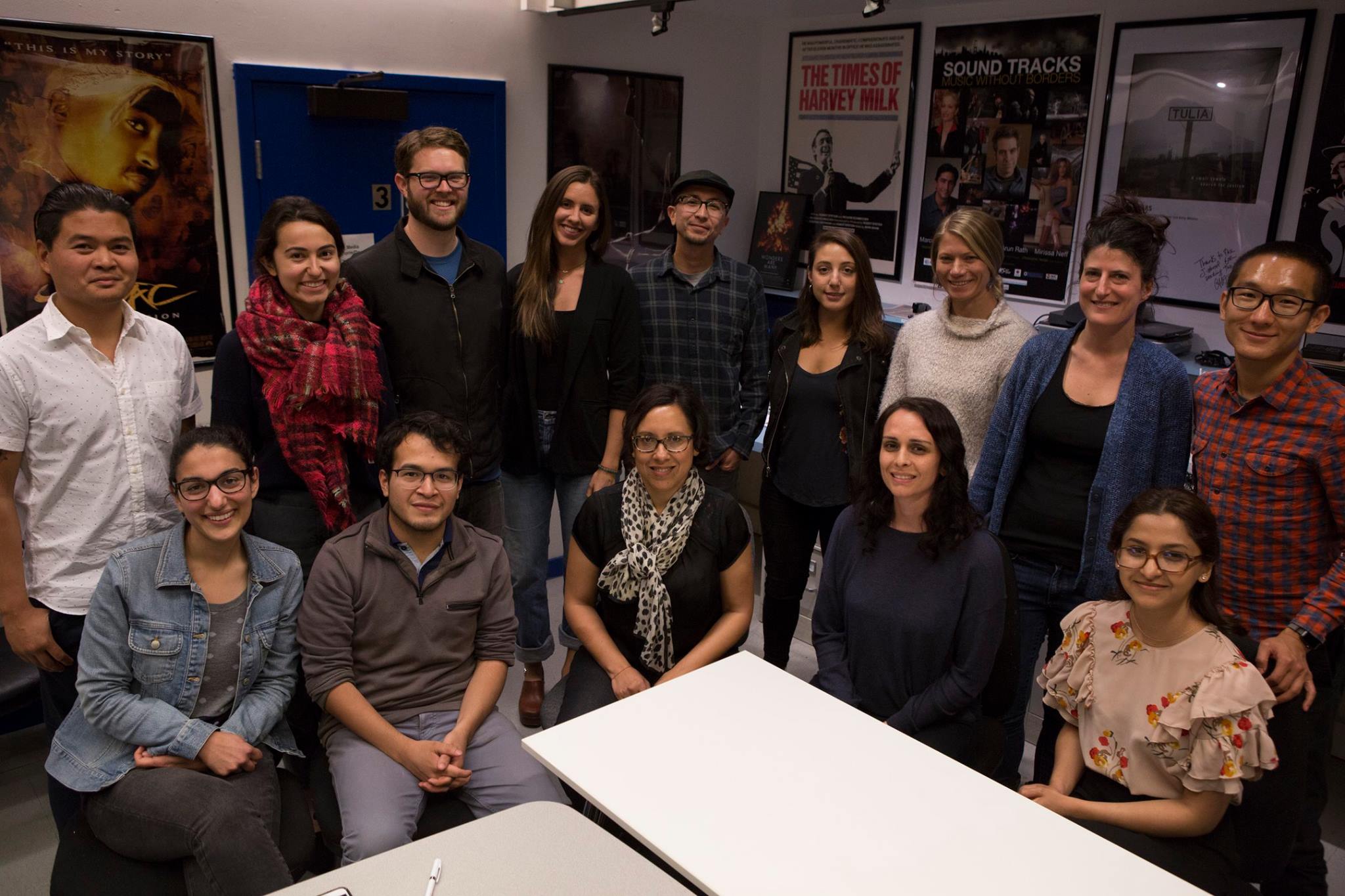
Award-winning filmmaker/alum Carrie Lozano (’05) (front row center) and students in History of Documentary class. Photo: Anne Wernikoff (’19)
Upcoming events and dates of interest: The deadline for admissions to the Class of 2021 is Dec. 1. We will host admissions info sessions at North Gate Hall on Aug. 15, Sept. 17 and Nov. 6. Admissions Director Camille Koué will be on a countrywide tour to talk about the School’s program and recruit a diverse class of talented, motivated and entrepreneurial students at the National Association of Hispanic Journalists annual conference, Miami, July 19 & 20; National Association of Black Journalists annual conference, Detroit, Aug. 1-3; Asian American Journalists Association annual conference, Houston, Aug. 9-10; The Association of LGBTQ Journalists annual conference, Palm Springs, Sept. 7 and the Idealist Grad Fair Sept. 24 in Atlanta.
On Oct. 8, the School will host its annual all-day Open House event. Participants meet faculty members, students and staff, sit in on classes and presentations, and learn about our financial aid and career planning services. RSVP here.
The Investigative Reporting Program (IRP) will hold its fourth Professional Workshop for Independent Filmmakers Sept. 23-25, funded by the John D. and Catherine T. MacArthur Foundation and the John S. and James L. Knight Foundation. The deadline to apply for the Workshop, which serves independent filmmakers who may not have studied investigative reporting, is June 15.
Upcoming exhibit in the School’s Reva and David Logan Gallery: Bill Owens’ “Suburbia” opens Sept. 14…
In closing, I want to remind you that we’re heading toward our fiscal close on June 30, and it’s a huge comfort to know how strongly our commitment to journalism’s civic mission is shared, particularly in light of the continuing hostility from some quarters about the news media. We’re hopeful that you’ll consider making a tax-deductible contribution, in amounts large or small, to support the training of the next generation of journalists, and in the long view, the vital contribution that Berkeley graduates are making to the profession.
The need for probing, intelligent and well-grounded journalism has never been greater, and as we have done over the past 50 years, Berkeley is forging the future leaders of the journalism a functioning democracy requires.
By supporting Berkeley Journalism, you are not only holding the ground for honest reporting and informed opinion. You are leading the charge.
Wishing you a fulfilling summer,
Edward Wasserman
Dean
About this communique: News from the Desk of Edward Wasserman is a quarterly email newsletter sent to alumni, donors, students, faculty, media partners and others in the J-School’s broad community. Should you wish to follow ongoing developments, please follow us on Facebook and Twitter @ucbsoj. Have alumni news or accomplishments to share? Please send it, along with a high-res headshot to us at journalism@berkeley.edu.

